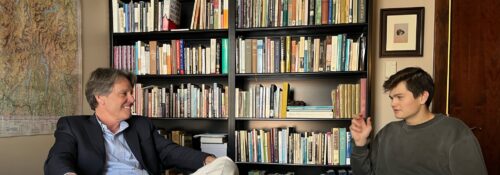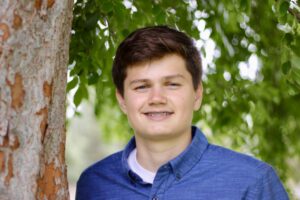
A Privilege to Teach: Seasoned Dr. Peters Finds Home at Hillsdale
Written by Brett Schaller
A group of my friends and I packed in my van and drove up to a quaint farm just east of Lansing, Michigan. The property belonged to Dr. Jason Peters, Hillsdale’s newest addition to the English Department. After Friday afternoon office hours, he had invited my friends and me to his farm. A detailed tour, long, brisk walk, and much-needed fire ensued, though not before threats of putting us all to work for the afternoon. The conversation ranged far and wide, centered often around the land he owned and the upkeep it required. Though our visit was just a few hours, it was an intimate look into his life. Peters recalled it more simply: “The time six guys showed up at my farm one Saturday, and we built a fire and stood around talking. That was pretty great.”
Peters began his career as a professor directly following graduate school at Michigan State University. After bouncing around a few liberal arts colleges in the Midwest on short-term contracts, Peters found a position at Augustana College in Rock Island, Illinois. At the time, Peters remembered, “It was the best thing that had happened to me,” given the competitiveness of the market. From there, tenure and full-time professorship followed. Peters would spend the next 25 years at Augustana.
Yet there was one thing Peters found lacking in his academic career: the chance to teach at a school with a strong core curriculum. More specifically, Peters explained that the allure of “the chance to teach a Great Books program” attracted him to Hillsdale. The chance to expose underclassmen students, especially non-English majors, to the essential literature of the Western canon was an opportunity Peters found nowhere else. Yet this wasn’t Peters’ first rodeo when it came to Hillsdale.
Peters’s history with Hillsdale stretched back to the mid-2000s, during which he’d attended a conference on Walter Hooper, C.S Lewis’s biographer. Recalling his first interaction with the campus, Peters remembered, “I was impressed by the feel of the place, the intellectual atmosphere of it.” Crossing paths with Hillsdale on occasion in the coming years, Peters developed a deep respect for its commitment to its principles and core curriculum. Peters recognized and affirmed Hillsdale’s commitment to eternal truths above vocational knowledge: “The thing about this place is that it’s committed to knowing stuff, reading books and knowing things, whereas a lot of core curricula now are just committed to skills, dispositions, and openness.” He saw in Hillsdale an understanding of the underlying truths and beliefs of a common tradition, which Peters argued is essential to maintaining the stability and health of a culture. As he explained, “when you lose a common culture, you lose a common storyline.”
“At a certain point,” Peters recalled, “I realized there was something special going on here.”
Peters remembered when his daughter began her college decision process: “I pretty much insisted she take a look at Hillsdale.” Emma, ’20, graduated from and worked at Hillsdale at the time of Peters’ arrival. Having an alumna in his family only strengthened his connection to Hillsdale, and when the opportunity arose to teach at Hillsdale, Peters felt it would be “crazy not to take it.”
Though he would be losing rank and leaving an established community, Peters recognized the special value of a teaching position at Hillsdale. “This is your one chance to be a part of something really worth being a part of,” he admitted thinking at the time. After a rigorous interview schedule, Peters was delighted to be offered a position in the English Department teaching American literature.
Coming to Hillsdale has enabled Peters to fulfill his aspirations of teaching in a true Great Books program as part of a strong liberal arts core committed to the Western literary tradition. Teaching Great Books II in the fall and Great Books I in the spring, Peters has relished the opportunity to instruct the Hillsdale student body. “The eagerness of the students,” he described, “their intellectual curiosity, their ability to do high-quality work, their willingness to do work—it’s been very refreshing.” Having students at all hours excited to discuss literature has made the classroom Peters’ favorite place at Hillsdale. “There are more really, really good students here than anywhere I’ve been,” Peters admitted. And the action doesn’t stop in the classroom.
Peters is crystal-clear about his role as a teacher at Hillsdale. “I’m not trying to get people just to be nice, in a soft-headed sort of way,” he stated. “I’m trying to help people be judicious and wise and smart.” Peters remains fully committed to his role in shaping self-governing students, be it teaching Homer to hapless freshmen, Melville to seasoned English majors, or the finer points of household farming to shivering young men.
Like many of Hillsdale’s students, Peters was attracted to the College from afar, and made serious sacrifices to teach here. In his eyes, they’re more than worth it. Peters is deeply grateful for the chance to teach and recognizes the importance of the role he has been tasked with at Hillsdale: what he described as the “great privilege of passing on something that someone passed onto you.”
Read more here:
From the USSR to Paris to Hillsdale with Dr. Anna Navrotskaya
From Pre-Med to Philosophy with Dr. Paul Rezkalla – Hillsdale College
Teaching America’s Great Stories: History Professor Wilfred McClay – Hillsdale College
Brett Schaller, ’24, is an English major and native of California, in that order. He enjoys the odd book, meal with loved ones, and ole’ game of soccer. Often perplexed by the inestimable blessings around him, he gives his eyes little respite from their staring at the world in which he finds himself.
Published in April 2022
